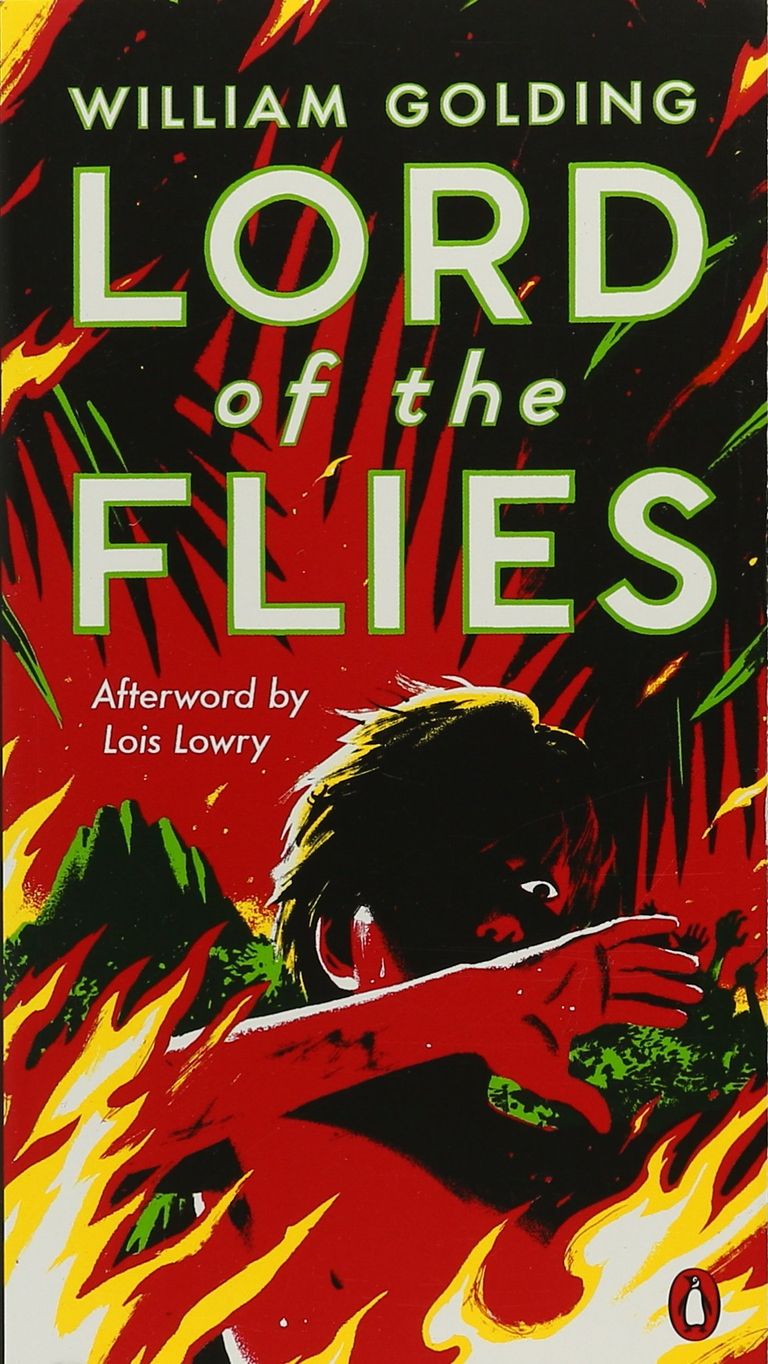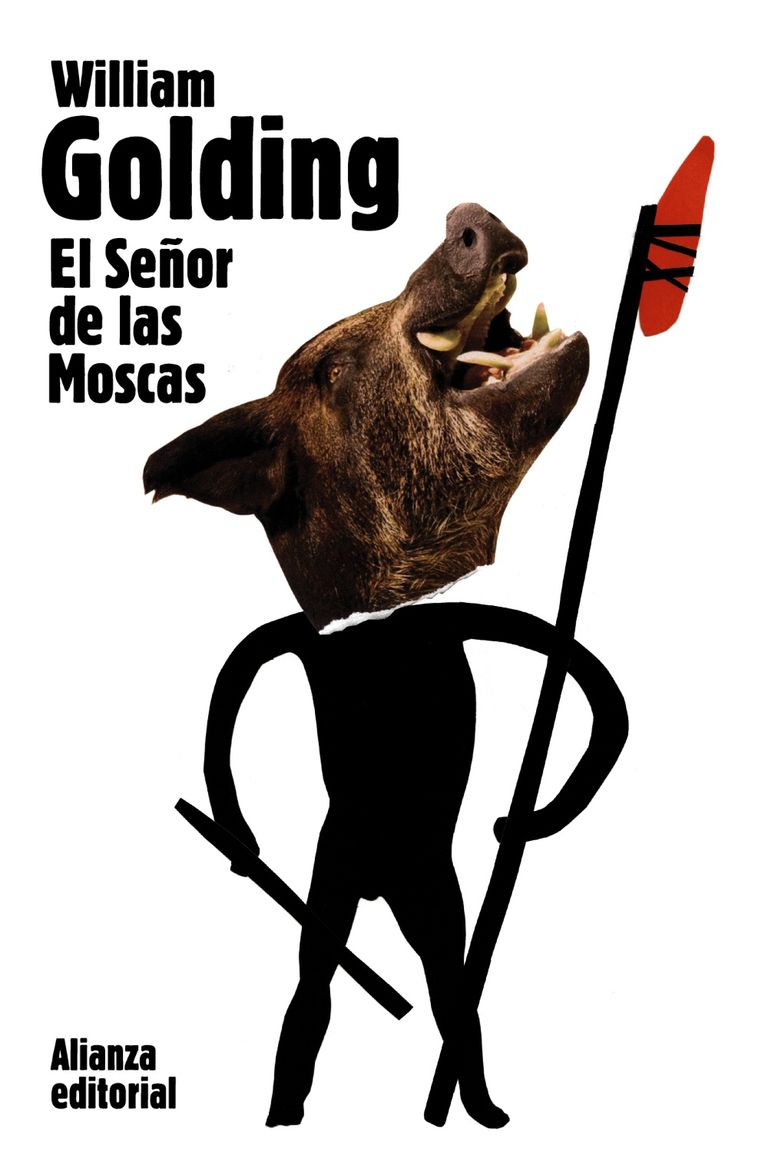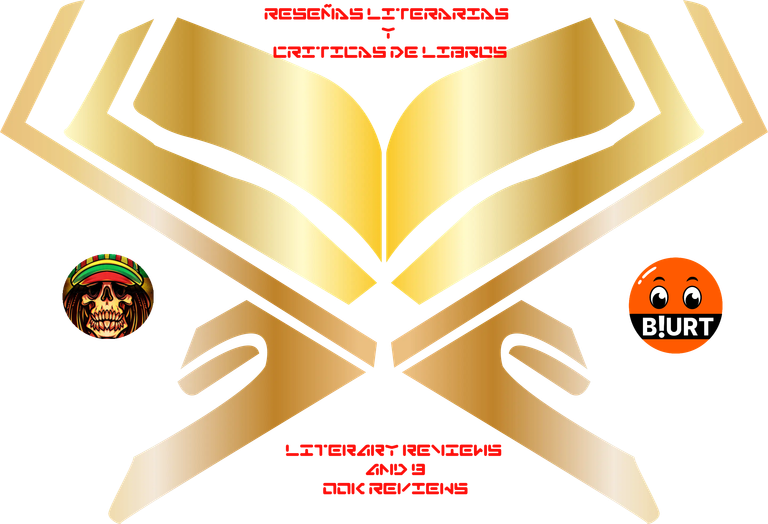
Lord of the Flies is a novel by British author William Golding. The book stars a group of British boys stranded on an uninhabited island and recounts their disastrous attempt at self-government.
Written in 1952, it was published two years later and was not very successful: in the USA it sold less than 3,000 copies in 1955 before selling out. However, the work became a bestseller with 14 million copies sold in English-speaking countries alone, boosted by the great success of the paperback publication in the US in 1959.

El señor de las moscas es una novela del escritor británico William Golding. El libro está protagonizado por un grupo de muchachos británicos varados en una isla deshabitada y narra su desastroso intento de autogobierno.
Escrita en 1952, se publicó dos años después y no tuvo mucho éxito: en Estados Unidos vendió menos de 3.000 ejemplares en 1955 antes de agotarse. Sin embargo, la obra se convirtió en un bestseller con 14 millones de ejemplares vendidos sólo en los países de habla inglesa, impulsado por el gran éxito de la publicación en rústica en EE.UU. en 1959.

Twenty or so English boys aged seven to fourteen, survivors of a plane crash, are left stranded on a tropical island. They have no problem surviving.
They organise themselves, elect a leader, the wise and strong-willed Ralph, but soon the community splits in two and the small group of hunters, led by Jack, takes over. He regresses to tribal status and devotes himself to the cult of a totem, the Lord of the Flies, who is an appellation of Beelzebub.
During a storm, a plane carrying some English boys, rescued from the warring city, crashes near a deserted island.
Two boys, Ralph and ‘Il Bombolo’ (Piggy in the original version), who seem to be the only survivors of the tragedy, find a seashell on the island, which, used as a ‘trumpet’, summons other boys who survived the disaster and arrived on the island, including Jack, Simon and the twins Sam and Eric.
The boys realise that, being on a deserted island, they are out of the control of their parents and other adults and that they need to organise themselves in order to survive in that place isolated from the world. They first elect Ralph as their leader and organise themselves into two groups: the first is headed by Ralph, the second by Jack and made up of the boys from the choir, who will be responsible for hunting and procuring food.
The boys' maturity is put to the test because of some facts that upset the castaways: one of them, Simon, asks the others how to survive the ‘crawling beast’, which the boys do not initially consider (due to Simon's constant hallucinations), but which is taken seriously when one of them, Percival Wemys Madison, claims to have seen the Beast coming out of the sea; the group finally splits up when, after a ship that could have brought them to safety passes by, Ralph accuses Jack and the hunters of letting a previously lit fire go out so that someone could spot them.
The situation collapses and Jack decides to offer the beast a pig's head attached to a stick planted in the ground and swarming with insects (the ‘lord of the flies’) and organise a ritual that evening. Simon decides to go to the rocks where the beast is sheltering and, after discovering that it is the corpse of a windswept paratrooper, returns to his companions, but is mistaken by Jack for the monster himself and killed.
While Ralph and Bombolo, in their shelter, reflect on the crime committed by Jack's gang, the latter sneaks up on them and steals Bombolo's glasses, without which he can only see shadows.
The next morning Ralph and Bombolo go to the rocks where Jack and the hunters are (who as punishment for the traitors condemn Peter to enter the monster's cave) to convince them to return the glasses and that it is useless to fight, but Roger hurls a huge boulder at Bombolo killing him.
Jack, now in the grip of madness, sets fire to the forest in the hope of killing Ralph, the last remaining member of the rival group, but when it seems the end has come for the latter, a squad of marines arrives on the island after seeing the fire to rescue the castaways.

Una veintena de niños ingleses de entre siete y catorce años, supervivientes de un accidente aéreo, quedan varados en una isla tropical. No tienen problemas para sobrevivir.
Se organizan, eligen un líder, el sabio y voluntarioso Ralph, pero pronto la comunidad se divide en dos y el pequeño grupo de cazadores, liderado por Jack, se hace con el control. Éste retrocede a la condición tribal y se dedica a adorar a un tótem, el Señor de las Moscas, que es un apelativo de Belcebú.
Durante una tormenta, un avión que transportaba a unos chicos ingleses, rescatados de la ciudad en guerra, se estrella cerca de una isla desierta.
Dos chicos, Ralph y «Il Bombolo» (Piggy en la versión original), que parecen ser los únicos supervivientes de la tragedia, encuentran en la isla una concha marina que, utilizada como «trompeta», convoca a otros chicos que sobrevivieron al desastre y llegaron a la isla, entre ellos Jack, Simon y los gemelos Sam y Eric.
Los chicos se dan cuenta de que, al estar en una isla desierta, están fuera del control de sus padres y otros adultos y que necesitan organizarse para sobrevivir en ese lugar aislado del mundo. Primero eligen a Ralph como su líder y se organizan en dos grupos: el primero encabezado por Ralph, el segundo por Jack y formado por los chicos del coro, que se encargarán de cazar y conseguir comida.
La madurez de los chicos se pone a prueba debido a algunos hechos que molestan a los náufragos: uno de ellos, Simon, pregunta a los demás cómo sobrevivir a la «bestia rastrera», algo que los chicos no consideran en un principio (debido a las constantes alucinaciones de Simon), pero que se toman en serio cuando uno de ellos, Percival Wemys Madison, afirma haber visto a la Bestia saliendo del mar; el grupo finalmente se divide cuando, tras el paso de un barco que podría haberles puesto a salvo, Ralph acusa a Jack y a los cazadores de dejar apagar un fuego previamente encendido para que alguien pudiera avistarlos.
La situación se desmorona y Jack decide ofrecer a la bestia una cabeza de cerdo atada a un palo plantado en el suelo y plagado de insectos (el «señor de las moscas») y organizar un ritual esa noche. Simón decide ir a las rocas donde se refugia la bestia y, tras descubrir que se trata del cadáver de un paracaidista azotado por el viento, regresa con sus compañeros, pero Jack lo confunde con el propio monstruo y lo mata.
Mientras Ralph y Bombolo, en su refugio, reflexionan sobre el crimen cometido por la banda de Jack, éste se acerca sigilosamente y roba las gafas de Bombolo, sin las cuales sólo puede ver sombras.
A la mañana siguiente Ralph y Bombolo se acercan a las rocas donde están Jack y los cazadores (que como castigo a los traidores condenan a Pedro a entrar en la cueva del monstruo) para convencerles de que les devuelvan las gafas y de que es inútil luchar, pero Roger lanza una enorme roca contra Bombolo matándole.
Jack, presa ya de la locura, prende fuego al bosque con la esperanza de matar a Ralph, el último miembro que queda del grupo rival, pero cuando parece que ha llegado el fin para este último, un escuadrón de marines llega a la isla tras ver el incendio para rescatar a los náufragos.

The predominant theme of the novel concerns the pessimistic view of man, whom the author believes to be intrinsically ‘bad’, both in nature and in society. In fact, Golding himself wrote that: ‘Man produces evil as bees produce honey’.
A second important theme concerns the inselvation of children, here the protagonists of the story. The critic Stefano Brugnolo, in fact, identifies how in the novel there is a sort of ‘collective going savage’[2], whereby the protagonists of the story, led by a young version of Kurtz from Heart of Darkness, namely Jack, begin to practise real human sacrifices. Ironically, as well as circularly (in fact, at the beginning of the book it is Jack himself who emphasises the moral superiority of the group due to their nationality[3]), the novel ends with a British officer stating that he expected something better from English children[4]. The soldier's statement, therefore, ironically and tragically signals how the group's unsavouriness is essentially due to the fact that Western culture, at its best, can at best conceal true human drives, which here present themselves as a desire for domination, wildness and madness.

El tema predominante de la novela se refiere a la visión pesimista del hombre, al que el autor considera intrínsecamente «malo», tanto en la naturaleza como en la sociedad. De hecho, el propio Golding escribió que «El hombre produce el mal como las abejas producen la miel».
Un segundo tema importante se refiere a la inselvación de los niños, aquí protagonistas de la historia. El crítico Stefano Brugnolo, de hecho, identifica cómo en la novela hay una especie de «salvajismo colectivo»[2], por el que los protagonistas de la historia, liderados por una versión joven de Kurtz de El corazón de las tinieblas, es decir, Jack, empiezan a practicar verdaderos sacrificios humanos. Irónica y circularmente (de hecho, al principio del libro, es el propio Jack quien subraya la superioridad moral del grupo debido a su nacionalidad[3]), la novela termina con la declaración de un oficial británico que esperaba algo mejor de los niños ingleses[4]. La declaración del soldado, por lo tanto, señala de forma irónica y trágica cómo la falta de salvación del grupo se debe esencialmente al hecho de que la cultura occidental, en el mejor de los casos, puede ocultar las verdaderas pulsiones humanas, que aquí se presentan como deseo de dominación, salvajismo y locura.



Fuente de la imagen banner final post / Image source banner final post.

Upvoted. Thank You for sending some of your rewards to @null. Get more BLURT:
@ mariuszkarowski/how-to-get-automatic-upvote-from-my-accounts@ blurtbooster/blurt-booster-introduction-rules-and-guidelines-1699999662965@ nalexadre/blurt-nexus-creating-an-affiliate-account-1700008765859@ kryptodenno - win BLURT POWER delegationNote: This bot will not vote on AI-generated content
Thanks!!